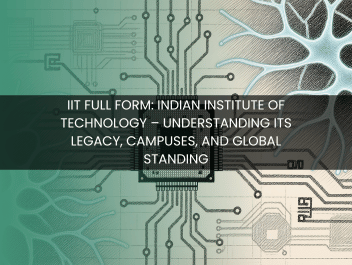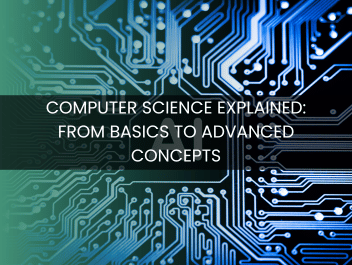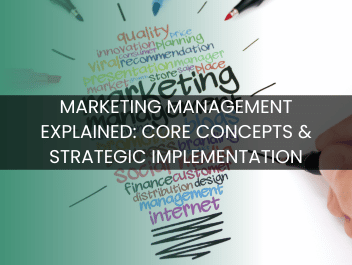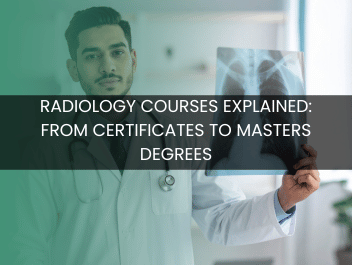
Comprehensive Guide to B.Tech Specializations for MPC Graduates
Navigating the path to a successful career after completing your 12th with MPC can be a daunting task. Many students often find themselves overwhelmed when choosing between the b tech courses list for mpc students and pondering over the best courses after 12th mpc other than engineering. The myriad of mpc career options and the promising mpc jobs list and salary details pose both opportunities and challenges, understanding which is crucial for informed decision-making.
The Bachelor of Technology (B.Tech) degree remains a popular choice among MPC graduates, with varied specializations ranging from Computer Science and Engineering to Biotechnology. However, understanding which course is best in intermediate and aligning it with your interests and career goals requires a detailed exploration of the career options after 12th mpc. This choice is significant not only for securing a lucrative position from the mpc group jobs list but also for personal and professional growth.
This comprehensive guide delves into the world of B.Tech specializations, offering insights on eligibility, admission procedures, and top colleges across India. We aim to provide a thorough exploration of the mpc jobs list and salary prospects, ensuring you make an informed choice among the best courses after 12th mpc tailored to your aspirations and skills.
Table of Content
- 1. Overview of B.Tech Specializations
- 2. Course Durations for Various Specializations
- 3. Eligibility Criteria for B.Tech Programs
- 4. Admission Process for B.Tech Courses
- 5. JEE Main 2025 and Other Entrance Exams
- 6. Direct Admission Without Examinations
- 7. Top B.Tech Colleges in India
- 8. Leading Government Colleges
- 9. Notable Private Institutions
- 10. Rankings and Reputation of B.Tech Colleges
- 11. Detailed B.Tech Syllabus Overview
- 12. Career Prospects for B.Tech Graduates
- 13. Salaries and Growth Opportunities
- 14. Top Recruiters for B.Tech Graduates
- 15. Comparing High-Salary Courses after MPC
Overview of B.Tech Specializations
B.Tech degrees are highly sought-after programs for MPC students interested in technical and engineering careers. With a strong foundation in Mathematics, Physics, and Chemistry, these students can explore various B.Tech specializations. Each specialization offers unique career opportunities and educational paths. From core engineering fields like Mechanical and Civil to emerging sectors like Biotechnology, B.Tech courses cater to diverse interests. Understanding the available options can help students align their career goals with their strengths and aspirations.
Computer Science and Engineering
Computer Science and Engineering is a top choice for many MPC students due to its broad range of career prospects. This specialization focuses on software development, programming, and the design of computing systems. It equips students with vital technical skills needed in the rapidly evolving tech industry. With the demand for software engineers on the rise, graduates often find high-paying jobs in sectors like IT, data science, and cybersecurity. This field's versatility allows professionals to work in diverse environments, from startups to multinational corporations.
Electronics and Communication Engineering
Electronics and Communication Engineering blends core subjects like electronics, control systems, and communication networks. This field is vital for the development of modern electronic devices and communication systems. MPC students interested in both hardware and software will find this specialization appealing. Graduates can pursue careers in telecommunications, consumer electronics, and defense. Due to the ever-growing demand for advanced communication technologies, jobs in this sector are plentiful and often offer competitive salaries.
Mechanical Engineering
Mechanical Engineering is a fundamental discipline that underpins many other engineering fields. It involves the design, analysis, and manufacturing of mechanical systems. This specialization is ideal for those intrigued by machinery and innovation. Mechanical engineers can work in various sectors, such as automotive, aerospace, and energy. They often engage in roles like Design Engineer and Manufacturing Engineer. With the industry's continuous demand for efficient and sustainable solutions, Mechanical Engineering promises diverse job opportunities and career advancement.
Electrical Engineering
Electrical Engineering deals with the study and application of electricity, electronics, and electromagnetism. It is crucial for developing power systems, electrical circuits, and electronic devices. MPC students with a keen interest in physics and mathematics may find this field rewarding. Electrical engineers often work in industries ranging from renewable energy to robotics. With the world leaning towards green technologies, this specialization offers exciting avenues for innovation and sustainable development.
Civil Engineering
Civil Engineering focuses on infrastructure development and is one of the oldest engineering disciplines. It encompasses designing, constructing, and maintaining infrastructure projects like bridges, roads, and buildings. For MPC students interested in urban planning and construction, this field offers substantial career opportunities. Civil engineers play a significant role in shaping the environment and ensuring public safety. As global populations grow, the demand for proficient civil engineers remains strong, ensuring stable and rewarding careers.
Chemical Engineering
Chemical Engineering bridges physical sciences with life sciences, incorporating elements of chemistry, physics, and mathematics to design processes for producing, transforming, and transporting materials. MPC students keen on chemical processes and industrial applications may find this field intriguing. Career options include roles in pharmaceuticals, food processing, and petrochemicals. Chemical engineering offers the potential for high salaries and roles in diverse industries, thanks to its crucial role in product manufacturing and innovation.
Information Technology
Information Technology covers the use of computers and telecommunications to retrieve, store, and send information. It's a dynamic field with broad applications, making it a popular choice for MPC students. IT professionals work in various roles, including network administration, system analysis, and database management. Given the rapid growth of internet-based technologies, there is a continuous demand for skilled IT professionals, offering robust career prospects and opportunities for advancement in technology-driven industries.
Biotechnology
Biotechnology applies principles of biology and engineering to develop products and technologies that improve the quality of life. This specialization is ideal for MPC students interested in genetic engineering, pharmaceuticals, and environmental conservation. Biotechnology professionals work in areas like biomedical research and agricultural development. As societies increasingly rely on scientific advancements to address health and environmental challenges, careers in biotechnology are both rewarding and impactful, making it a promising path for aspiring scientists and engineers.
Course Durations for Various Specializations
Understanding the duration of various specializations is essential for making informed career choices. Here's a quick overview:
|
Specialization |
Course Duration |
|
Mechanical Engineering |
4 years |
|
Civil Engineering |
4 years |
|
Electrical Engineering |
4 years |
|
Chemical Engineering |
4 years |
|
Aerospace Engineering |
4 years |
|
Biomedical Engineering |
4 years |
|
Marine Engineering |
4 years |
|
Genetic Engineering |
4 years |
|
Electronics and Communication Engineering |
4 years |
Most Bachelor of Technology (B.Tech) courses, including Mechanical, Civil, and Chemical Engineering, typically last for four years. These programs provide a comprehensive curriculum to build a strong foundation in technical skills.
For students after 12th in the MPC (Math, Physics, Chemistry) stream, these courses offer vibrant career options. Whether your interest lies in Aerospace or Biomedical fields, a four-year commitment could set you on a path to high-paying jobs and fulfilling career prospects.
Consider this table as you decide which specialization aligns best with your career goals and entrance exam scores.
Eligibility Criteria for B.Tech Programs
To enroll in a B.Tech program, candidates must meet specific eligibility criteria. Firstly, they should have completed their 12th grade with an MPC (Maths, Physics, Chemistry) stream, which lays a strong foundation for engineering fields. A minimum aggregate score of 50% in these core subjects is usually required, though some institutions may have a higher cut-off.
Entrance exams are a crucial part of the eligibility process. Aspirants need to qualify in national or state-level entrance exams like JEE Main, JEE Advanced, or other specific tests conducted by private colleges and government institutions. The entrance exam scores play a significant role in securing admission.
In addition, applicants should be aware of age criteria. Generally, candidates should be at least 17 years old. Each college may have specific criteria, such as reservations or quotas for different categories, making it essential to check individual college requirements.
B.Tech admission embodies an essential step towards a career in engineering and offers various career options like mechanical engineering, electrical engineering, and software development. Understanding and meeting these criteria is vital for students aiming to pursue high-paying jobs and fulfilling career opportunities in the technology sector.
Admission Process for B.Tech Courses
The journey to enrolling in a B.Tech program is pivotal in shaping one's engineering career. To gain admission, students must navigate through a series of steps, each crucial to securing a seat in their desired institution. The admission process typically begins with fulfilling the minimum eligibility criteria, which for most institutions includes completing 12th grade with an MPC (Maths, Physics, Chemistry) background. Prospective students should be prepared for entrance exams as they play a significant role in the selection process. For those considering engineering courses, understanding the nuances of these entrance exams and other admission routes is essential.
JEE Main 2025 and Other Entrance Exams
The Joint Entrance Examination (JEE) Main 2025 is a key entrance exam for B.Tech aspirants. This exam is a gateway to prestigious institutes, including NITs and IIITs. It evaluates a student's understanding of core subjects: Maths, Physics, and Chemistry. Besides JEE Main, students often consider exams like JEE Advanced for entry into IITs, along with state-level tests and exams conducted by private colleges. Each exam demands thorough preparation and a strong grasp of technical skills. Scoring high can lead to significant career prospects in high-paying jobs within the engineering field.
Direct Admission Without Examinations
For students who prefer alternate routes, direct admission can be an appealing option. Some institutions offer admission without entrance exams based on merit in the 12th-grade exams or through management quotas. While entrance exams are crucial for top-tier colleges, direct admission provides an opportunity for students to pursue engineering courses without facing competitive tests. This route often involves careful selection of private colleges where securing a seat might depend on the availability and specific college criteria. It's an ideal path for those who meet the eligibility criteria but wish to avoid the rigorous process of entrance exams. Understanding these options allows students to find the best fit for their educational and career goals.
Top B.Tech Colleges in India
India is home to many esteemed institutions that offer Bachelor of Technology (B.Tech) degrees. Students who have completed intermediate studies with an MPC group, focused on Math, Physics, and Chemistry, often look to these top colleges for a robust education in engineering fields. These B.Tech courses provide a strong foundation for those aiming for high-paying jobs in engineering sectors. Whether in mechanical engineering, electrical engineering, or newer fields like genetic engineering, India's engineering colleges offer diverse opportunities. This list highlights some of the best government and private colleges renowned for their academic excellence and career prospects.
Leading Government Colleges
Leading government colleges are known for providing high-quality education at a reasonable fee structure. Institutes like the Indian Institutes of Technology (IITs) and the National Institutes of Technology (NITs) top the list due to their rigorous curriculum and emphasis on research and technical skills. Students from MPC backgrounds who perform well in entrance exams often secure seats in these institutions, aiming to specialize in fields like Civil Engineering, Aerospace Engineering, or Electronics and Communication Engineering. The focus in government colleges is on core subjects, offering valuable career options after 12th MPC.
Delhi Technological University (DTU) and the College of Engineering Pune (CoEP) are other notable mentions in this category. These colleges emphasize practical knowledge and industry collaborations, preparing students for various career opportunities and jobs in the engineering field. Career goals often shape the choice of specialization, with areas like software development and control systems being popular. Graduates from these institutions are highly sought after in both public and private sectors, making them prominent on the MPC group jobs list.
Notable Private Institutions
Notable private institutions offer competitive academic programs with state-of-the-art facilities and infrastructure. Institutions like Birla Institute of Technology and Science (BITS Pilani) and Vellore Institute of Technology (VIT) are synonymous with quality education in the engineering domain. They offer a variety of B.Tech courses, catering to different areas of interest for MPC students. These courses often incorporate modern teaching methodologies focused on developing technical skills essential for the professional world.
Private colleges generally require entrance exam scores, and they provide a diverse range of career options after 12th MPC. Fields like Biomedical Engineering, Marine Engineering, and Manufacturing Engineer are examples of specialties that attract students aiming for innovation-driven careers. The flexibility in curriculum design allows for a focus on both core and emerging fields, enhancing career prospects significantly. The emphasis on industry partnerships and internships ensures that students graduate with practical experience, preparing them for a successful entry into the engineering workforce.
Rankings and Reputation of B.Tech Colleges
When choosing a B.Tech college, rankings and reputation play a crucial role in decision-making. Top-ranked institutions offer a strong foundation in engineering courses, paving the way for high-paying jobs. These colleges tend to excel in research, employ highly qualified faculty, and maintain robust industry connections.
Here's a quick summary of what to consider:
- National and International Rankings: Institutions like IITs, NITs, and BITS Pilani rank high both nationally and internationally, thanks to their academic rigor and career prospects.
- Reputation: Well-regarded colleges often offer diverse and popular courses like Mechanical Engineering, Civil Engineering, and Electronics and Communication Engineering, ensuring a wide array of career options.
- Placement Records: Look for colleges with excellent placement stats, particularly those offering software development and technical skills training.
- Infrastructure and Facilities: Modern labs, libraries, and learning resources are key features of top colleges.
- Alumni Network: A strong alumni network can assist in future career opportunities.
In conclusion, selecting the best B.Tech college involves examining rankings, reputation, placement history, and academic offerings. Prioritize institutions with a history of fostering successful career paths and providing well-rounded educational experiences.
Detailed B.Tech Syllabus Overview
Understanding the B.Tech syllabus is crucial for success in the engineering field. B.Tech programs offer specialized education focused on technical skills and theoretical knowledge. This comprehensive syllabus is designed to equip students with a profound understanding of engineering principles and practical applications. Covering both core and elective courses, the B.Tech curriculum ensures students gain expertise in their chosen field. The syllabus is continuously updated to integrate the latest technological advancements and industry needs. This helps students not only to acquire technical skills but also to adapt to new challenges and opportunities in various engineering careers.
Core Subjects in B.Tech
Core subjects form the backbone of any B.Tech program. These foundational courses are mandatory and lay the groundwork for more specialized topics. In the earlier semesters, students encounter subjects like Mathematics, Physics, and Chemistry, which are critical for understanding advanced engineering concepts. As they progress, courses like Engineering Mechanics, Thermodynamics, and Control Systems come into play. Each discipline, whether it's Mechanical, Electrical, or Civil Engineering, includes core subjects tailored to its specific needs. By mastering these subjects, students build a strong foundation for their engineering education, preparing them for both theoretical understanding and practical application.
Elective Courses
Elective courses offer students the opportunity to tailor their education according to personal interests and career goals. These courses provide flexibility in choosing subjects that extend beyond core topics, allowing for a more personalized educational experience. Whether it's delving into cutting-edge areas like Artificial Intelligence, Robotics, or Environmental Engineering, electives enable students to explore career prospects in diverse fields. Electives encourage interdisciplinary study, which is valuable in today's interconnected job market. By engaging in electives, students can enhance their skill set and increase their employability across various sectors, aligning their academic journey with their career aspirations.
Career Prospects for B.Tech Graduates
Graduating with a Bachelor of Technology (B.Tech) degree opens doors to a multitude of career options. Engineering is a field known for its diversity and impact, offering graduates the chance to engage with groundbreaking technologies and innovative projects worldwide. Not only do B.Tech graduates gain technical skills, but they also acquire problem-solving abilities crucial for today’s job market. Whether you decide to work in mechanical engineering, electrical engineering, or another specialty, there is a career path for you. With the right focus and dedication, your career goals can lead you to rewarding opportunities across various sectors and industries.
Job Roles and Industries
B.Tech graduates find themselves in a variety of job roles across multiple industries. In mechanical engineering, you could work as a Design Engineer, focusing on creating efficient and effective designs for products. Similarly, civil engineering offers roles like Construction Project Manager where you'll oversee building projects from start to finish. Electrical engineering is another common career choice, with roles like a Power Systems Engineer ensuring uninterrupted power across cities. Emerging fields like genetic engineering and software development also present exciting new opportunities for recent graduates. With technical skills honed during your studies, diverse career options are certainly within reach for any B.Tech graduate.
Salaries and Growth Opportunities
The salaries for B.Tech graduates vary widely, but the potential for growth is substantial. Starting roles in private colleges or government sectors can offer a strong foundation with competitive pay. Engineering roles often come with high growth potential, both in terms of salary and career advancement. For example, professionals in electronics and communication engineering or chemical engineering often see increased earnings as they gain more experience. Career opportunities expand as individuals develop technical expertise and gain more responsibility in their roles. With the right experience and skill set, high-paying jobs are within reach for B.Tech graduates, encouraging continual career progression.
Top Recruiters for B.Tech Graduates
Top recruiters for B.Tech graduates are often at the forefront of technology and innovation. Leading engineering companies and industrial giants look for talented individuals to join their teams. Civil engineering companies may recruit graduates for infrastructure projects, while electronics firms seek expertise in control systems. Technology firms, particularly those involved in software development, are always on the lookout for skilled professionals who can keep up with fast-paced advancements. Additionally, government agencies also provide stable mpc group jobs with attractive benefits. With a wide array of recruiters, B.Tech graduates are well-positioned to find roles that align with their career aspirations and goals.
Comparing High-Salary Courses after MPC
Choosing the right course after 12th MPC can shape your career. The b tech courses list for mpc students is vast, offering diverse and high-paying career opportunities. Some best courses after 12th mpc other than engineering include Computer Science, Data Science, and Cybersecurity.
Career options after 12th MPC are vast. B Tech in Mechanical, Civil, or Electrical engineering is popular. These courses are the foundation of many MPC career options, leading to rewarding roles in industries. The mpc jobs list and salary varies, with Design Engineer and Software Development roles being lucrative choices.
Which course is best in intermediate? Focus on your interests; engineering, science, or commerce can all be fruitful. The most popular mpc group jobs list includes Software Developers, Data Analysts, and Financial Analysts. These roles offer high salaries and growth potential.
Here are some mpc career options with their average salaries:
|
Course/Job |
Average Salary (INR) |
|
Software Developer |
4-8 Lakhs |
|
Data Analyst |
4-7 Lakhs |
|
Mechanical Engineer |
3-6 Lakhs |
Choose the best courses after 12th mpc for a strong career path.
Looking For Job Satisfaction on the long run?
Please feel free to contact our experts
Call to ask any question
+91-9319336222Monday to Saturday
(9:00 AM to 8:00 PM)Resent Blogs
10 Things to Do During an Interview to Impress Your Future Employer
Learn MoreCrafting Your Personal Narrative: A Guide to Writing About Yourself
Learn MoreTop 10 Essential Interview Questions and Expert Answers for 2025
Learn MoreAce Your Next Interview: Essential Questions and Expert Answers for 2025
Learn MoreFirst-Time Manager Interview: Crucial Questions and Strategies for Success
Learn More150 Essential General Knowledge Questions for Interviews in 2025
Learn MoreMaster the Google Interview: Strategies for Success in 2025
Learn MoreHow Can You Describe Yourself Professionally? 5 Key Strategies You Need to Know
Learn MoreMastering the Art of How to Take Interview: Essential Techniques for Success
Learn More25 Essential HR Interview Questions and Answers PDF You Can't Ignore
Learn More7 Tips to Ace Your HR Screening Round and Land Your Dream Job
Learn More10 Essential Tips for Acing Your Interview Exam
Learn More5 Unique Interview Format Examples to Stand Out in Your Next Interview
Learn More5 Powerful Techniques for a Memorable Interview Introduction
Learn MoreMaster Your Next Interview with These Top Interview Preparation Apps
Learn MoreMastering the Art: Top Interview Questions for 12th Class Students
Learn More7 Must-Know Interview Questions for Freshers to Ace Your Job Hunt
Learn MoreMastering Interview Questions for HR Position with Answers: Strategies for Success
Learn More12 Essential Interview Questions for Recruiter Position You Should Prepare For
Learn More10 Must-Know Interview Questions UK Employers Love to Ask
Learn More10 Creative Interview Writing Examples to Spark Your Imagination
Learn More15 Essential Managerial Interview Questions for Freshers to Prepare
Learn More15 Unique Marketing Interview Questions You Haven't Prepared For
Learn More7 Key Strategies for a Successful Mock Interview Session
Learn MoreThe Ultimate Guide to Model Interview Questions: What You Need to Know
Learn More5 My Self Question Exercises to Unlock Your True Potential
Learn More10 Normal Questions That Can Spark Deep Conversations
Learn More15 Essential Personal Interview Questions for Freshers to Ace Your Next Job
Learn More10 Essential Phone Interview Questions You Can’t Afford to Ignore
Learn More15 Essential Sales Interview Questions and Answers for Freshers
Learn More7 Key Situational Interview Questions Every Employer Should Ask
Learn More15 Essential Software Developer HR Interview Questions You Need to Prepare For
Learn MoreMastering the Technical Interview: Essential Questions and Answers
Learn MoreTop Strategies for Responding to Tell Me About Yourself in a Student Interview
Learn MoreTop 10 Interview Questions and Expert Answers
Learn MoreMastering the Art of Interviewing: 50 Tough Questions and Smart Answers
Learn MoreHow to Ace Your Next Mock Interview: Tips and Strategies for Success
Learn MoreYour Ultimate Guide: 60 Insightful Questions to Ask Interviewers
Learn MoreCrafting the Perfect Response to Why Do You Want This Job?
Learn MoreUnique Ways to Tackle the Question Why Should We Hire You?
Learn MoreWhy Should We Hire You? - Top 10 Answers for Customer Service Roles
Learn MoreMastering the Art of Discussing Work Experience in Interviews
Learn MoreMastering Your Sales Interview: 50 Essential Questions and Answers
Learn MoreCareer Paths After 12th Commerce: Your Future Starts Here
Learn MoreExplore One-Year Courses After 12th for Non-Medical Students
Learn MoreQuick Career Paths: 2-Year Degree Courses After 12th for Fast-Track Success
Learn MoreComprehensive Guide: Courses After 12th Commerce
Learn MoreTop 10 Lucrative Courses to Consider After Completing Engineering
Learn MoreAdvancing Your Career: Top Choices After B.Tech in 2025
Learn MoreExplore Your Future: After CET Exam Which Course is Best for Aspiring Professionals?
Learn More5 Reasons Why After Inter CEC, Choosing the Right Course is Crucial
Learn MoreAfter PUC Which Course is Best for Aspiring Engineers? Explore Your Options!
Learn MoreUnlocking Your Future: Best Arts and Science Courses After 12th for 2025
Learn MoreWhy a Bachelor Degree in Commerce is Your Pathway to Success
Learn More15 Best Career Courses to Boost Your Earning Potential in 2025
Learn MoreEmerging Career Fields for 2025: What You Need to Know
Learn MoreExploring In-Demand Career Paths After 12th: Science, Arts, Commerce
Learn More15 Lucrative Science Careers You Should Consider
Learn MoreHigh-Paying Career Paths for Girls After 12th Commerce
Learn MoreTop 10 High Salary Career Courses After 12th Biology
Learn MoreTop 10 High-Paying BSc Specializations for 2025
Learn MoreExploring the Future: Innovative Career Paths for B.Tech Graduates in 2025
Learn MoreComprehensive Guide to B.Tech Specializations for MPC Graduates
Learn MoreUnlocking Your Potential: The Ultimate B Tech Job List for 2025
Learn MoreB.Tech Salary Insights: How Much Can You Earn Per Month?
Learn MoreEssential Business Courses After 12th: Your Guide to a Successful Career
Learn MoreHow Commerce Students Can Transition to BSc IT
Learn MoreExploring Career Paths After 12th: Your Guide to Success in 2025
Learn MoreCertainly! Here are 10 additional title ideas inspired by the list you provided
Learn MoreExploring Career Paths After Engineering: Your Guide to the Future
Learn MoreThe Ultimate Guide to Career Options Post-High School Graduation
Learn MoreDiscover the Top 10 Chemistry Courses After 12th That Lead to High-Paying Jobs
Learn MoreExplore the Best Diploma and Certificate Programs After 12th Commerce
Learn MoreCareer Paths for Computer Science Graduates: Top Opportunities to Explore
Learn MoreExplore Top Courses After 12th: Your Path in Science, Arts, or Commerce
Learn MoreTop 10 Courses After 12th Commerce for a Successful Career
Learn MoreTop Paying Professional Courses After 12th for Commerce Students
Learn MoreEmerging Career Paths After 12th Commerce Without Maths
Learn MoreExploring Career Paths After 12th Science: A Complete Guide
Learn MoreComprehensive Guide to Courses and Career Paths after 12th Grade
Learn MoreEmerging Career Paths in India: What to Expect in 2025
Learn MoreTop Diploma Paths for Students After Completing 12th Science
Learn MoreTop 15 Easiest High-Paying Jobs to Pursue in India by 2025
Learn MoreNavigating Your Future: Easy Degree Options After 12th
Learn MoreExploring Top Engineering Branches After 12th: A Comprehensive Guide
Learn MoreExploring Advanced Studies: Top Entrance Exams for Engineering Graduates
Learn MoreMBA Salary Insights: Top Packages and Compensation Trends in India
Learn MoreTop 15 Lucrative Careers in India for 2025
Learn MoreTop 10 High-Paying Jobs for Commerce Graduates Without Maths
Learn MoreTop 10 High Salary Courses After 12th PCB for Future Success
Learn MoreHigh-Earning Courses to Pursue After 12th Science in 2025
Learn MoreHigh Paying Career Paths for BiPC Students: Top 10 Courses to Consider
Learn MoreExploring High-Paying Engineering Degrees for the Future
Learn MoreExploring Integrated Courses After 12th: A Comprehensive Guide for Students
Learn MoreExploring Career Prospects: What Can You Do with a BBA Degree?
Learn MoreTop 15 In-Demand Professional Courses for Commerce Graduates in 2025
Learn MoreExploring Lucrative Job Paths for BBA Graduates in 2025
Learn MoreMBA Full Form Explained: Master of Business Administration & Its Strategic Career Value
Learn MoreBBA Full Form: The Definitive Guide to BBA Degrees, Admissions, & Career Paths
Learn MoreBCA Full Form Explained: Your Complete Guide to the Degree, Admission & Career Scope
Learn MoreIAS Full Form: Indian Administrative Service Explained & Its Pivotal Role
Learn MoreMBBS Full Form: Unraveling the Meaning Behind a Doctors Qualification
Learn MoreUPSC Full Form: Union Public Service Commission and Its Vital Role
Learn MoreBSc Full Form: Bachelor of Science & What It Means for Your Future
Learn MoreITI Full Form: What Exactly is Industrial Training Institute?
Learn MoreLLB Full Form: Your Ultimate Guide to Bachelor of Laws, Eligibility & Career Scope
Learn MoreIs There a True Computer Full Form? Unpacking the Popular Acronym
Learn MoreB.Tech Full Form Unpacked: Meaning, Scope, and Why It Matters for Your Career
Learn MoreIIT Full Form: Unveiling the Indian Institute of Technology and Its Legacy
Learn MoreMCA Full Form Revealed: Master of Computer Applications & Its Significance
Learn MoreIIT Full Form: Indian Institute of Technology – Understanding Its Legacy, Campuses, and Global Standing
Learn MoreYour Complete Guide to Becoming a Veterinarian: Education, Specialties & Career Paths
Learn MoreBSc Degree: Your Complete Guide to Courses, Careers, and Future Prospects
Learn MoreB.Com Full Form Unveiled: What Bachelor of Commerce Truly Means
Learn MoreBAMS Full Form: Bachelor of Ayurvedic Medicine and Surgery — Unpacking Its Meaning & Career Scope
Learn MoreWhat is a Polytechnic? Your Complete Guide to Courses, Admissions & Career Paths
Learn MoreSSC GD Constable Exam News 2025-26: Latest Updates on Vacancies, Dates & Application
Learn MoreHow to Choose the Best Veterinarian for Your Pet: A Comprehensive Guide
Learn MoreAir Hostess 2026: Your Complete Roadmap to Landing the Dream Job
Learn MoreUnlocking Your Future: The Ultimate BSc Degree Guide (Courses, Careers & Admissions)
Learn MoreCMA Full Form: Certified Management Accountant (Global Standard Explained)
Learn MoreNACH Full Form Explained: What It Is & Why It Matters in Banking
Learn MoreThe Modern Anthropologist: Understanding Their Role, Impact, and Diverse Specializations
Learn MoreBBA: Your Ultimate Guide to Course Details, Admission, Fees, and Future Career Prospects
Learn MoreBDS Full Form Unpacked: Your Essential Guide to Dentistry Courses, Admissions & Career Scope
Learn MoreBHMS Full Form Revealed: Your Complete Guide to Bachelor of Homeopathic Medicine & Surgery
Learn MoreB.Tech Admissions 2026: Your Complete Guide to Courses & Eligibility
Learn MoreCFA Full Form: Understanding the Chartered Financial Analyst Designation
Learn MoreMerchant Navy Salary in India: Unveiling Pay Scales by Rank & Experience
Learn MoreTS EAMCET 2026: Official Notification, Exam Dates & Application Guide
Learn MoreVITEEE 2026: Full Guide to Application, Dates, Syllabus & Preparation
Learn MoreBMS Full Form: Unveiling Bachelor of Management Studies & What it Entails
Learn MoreB.Sc. Computer Science: Your Complete Guide to Courses, Careers & Eligibility
Learn MoreComputer Science Explained: From Basics to Advanced Concepts
Learn MoreWorlds Most Difficult Exams: A Definitive Ranking for 2025
Learn MoreUnion Public Service Commission (UPSC): All You Need to Know
Learn MoreBE Full Form Explained: What Bachelor of Engineering Means & Your Career Path
Learn MoreDMIT Full Form Revealed: Unpacking the Dermatoglyphic Multiple Intelligence Test
Learn MoreIndias Most Difficult Exams: The Ultimate Ranking for 2025
Learn MoreCLAT Full Form: Unveiling the Common Law Admission Test + Key Details
Learn MoreHighest Paying Jobs in India: Unveiling the Top 25 Roles & Their Lucrative Salaries
Learn MoreMA Full Form: Unpacking the Master of Arts Degree & What It Entails
Learn MoreMarketing Management Explained: Core Concepts & Strategic Implementation
Learn MoreBCA Course Subjects: A Comprehensive Guide to Your IT Degree Curriculum
Learn MoreCAT Exam Date 2026: When to Apply & Exam Schedule Revealed
Learn MoreCDS Full Form: Unveiling Combined Defence Services & Your Path to Commission
Learn MoreLab Technician Career Path: Duties, Skills, and Salary Guide
Learn MoreYour Complete Guide to Becoming a Successful Software Developer
Learn MoreAir Hostess Course Guide: Everything You Need to Know for Your Aviation Career
Learn MoreIntroduction: Navigating Your Path to Medical Excellence in India
Learn MoreTop Commerce Courses After 12th: Unlock Lucrative Career Paths
Learn MoreTop Industrial Training Institutes: Your Guide to Skilled Trades
Learn MoreUnderstanding Psychometric Tests: Your Definitive Guide & Free Examples
Learn MoreWhat Does a Surgeon Do? A Comprehensive Guide to the Profession
Learn MoreUG Explained: Your Ultimate Guide to Undergraduate Degrees & Admissions
Learn More10th Pass Govt Jobs 2026: Your Complete Guide to Apply & Secure Your Career
Learn MoreATMA: Your Complete Guide to the Management Admissions Test
Learn MoreBHMS Course Guide: Eligibility, Syllabus, Career Prospects & Top Colleges
Learn MoreUnlock Your Future: The Definitive Guide to Career Counselling
Learn MoreWhat Does a Clinical Psychologist Do? Your Comprehensive Guide
Learn MoreM.Tech Full Form: Master of Technology Explained (Meaning, Scope & Benefits)
Learn MoreRadiology Courses Explained: From Certificates to Masters Degrees
Learn MoreBSc Courses Explained: Full Guide to Specializations, Admissions & Career Paths
Learn MoreBSc Nursing Course: Admission Guide, Eligibility, Syllabus & Career Paths
Learn MoreBA LLB Full Form Explained: Unpacking Bachelor of Arts & Bachelor of Laws
Learn MoreTop BBA Colleges in India: Unveiling the Elite Institutions for Your Management Degree
Learn MoreUPSC CDS Exam Date 2026: Complete Schedule & Notification Details
Learn MoreTop Career-Focused Courses After 12th Grade: Unlock Your Future
Learn MoreExplore the World of Humanities Subjects: A Comprehensive Guide
Learn MoreIPU CET 2026: Complete Guide to Applications, Syllabus & Cutoffs
Learn MoreISI Full Form: Unveiling the Meaning & Importance of the Indian Standards Institute
Learn MoreJEE Advanced 2026 Exam Date: When Will the Exam Be Held?
Learn MoreJEE Main 2026 Result Date: When to Expect Session 1 & 2 Results
Learn MoreMCA Course Guide: Everything You Need to Know About Eligibility, Fees, and Admissions
Learn MoreMultimedia Explained: Your Complete Guide to Definition, Examples, and Impact
Learn MoreThe Ultimate Paramedical Courses List: Find Your Perfect Career Path
Learn MorePharm.D. Program: Your Complete Guide to Curriculum, Admissions & Outcomes
Learn MoreThe Ultimate Guide to Top IIT Colleges in India: Ranking, Admissions, and Courses
Learn MoreATC Full Form: Unpacking Air Traffic Control, Anatomy & More
Learn MoreB.Ed. Course Duration in India: Everything Aspiring Teachers Need to Know
Learn MoreB.Sc Psychology Degree: Your Guide to Admissions, Curriculum & Career Paths
Learn MoreB.Tech Computer Science: Your Complete Guide to Admission, Syllabus & Career Prospects
Learn MoreBDS Course Duration: How Long is Bachelor of Dental Surgery?
Learn MoreBFA Full Form Explained: What is a Bachelor of Fine Arts & Why it Matters
Learn MoreConnet Us
Unlock Your Dream Career Potential - Get Expert Advice From Our Counselling Experts























































































































_Thumbnail_.png )
_Thumbnail_.png )














_All_You_Need_to_Know_Thumbnail_.png )
























_Thumbnail_.png )























